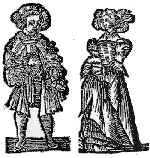Genre: To limit one's search to a particular
genre, simply enter the
genre code into the Genre box. One may search more than one genre at a
time;
the vertical bar ( | ) serves as the OR operator (e.g., Comedia|Jacara).
- Auto Sacramental
- Baile.
- Colloquio.
- Comedia.
- Dialogo.
- Entremes.
- Jacara.
- Loa.
- Paso.
- Tragedia.
- Tragicomedia.
- Zarzuela.
Orthographic Considerations:
Do not expect standard orthography in this database of sixteenth,
seventeenth, and early eighteenth century texts. For example, one finds
forms such as muerte and mverte; venganza, venganca, vengança, and
bengança. Wildcard characters or Boolean operators can help detect such anomalies.
One may enter m[u|v]erte or
muerte|mverte or .engan.a to achieve the desired results.
Words that contain accented characters must be entered as such; however, in order to enter
words without having to pay attention to accents simply turn on Caps Lock
and type in all uppercase. Thus, entering NUNO finds the name
Nuño. This is best since accentuation is not always consistent (one
can find, for example, the following forms in the database: ira,
irà, irá, irâ, ìra, ìrà,
íra, and îra).
Data-Entry Idiosyncrasies:
Several data-entry errors have been found in some databases either from
typesetting errors in the original source or
from rekeying the documents. One should avoid making arguments from
silence. In particular, look out for the
transposition or doubling of letters or word-clustering. Also, some
confusion occasionally seems to have arisen between the letter "n" and the
letter "u" (e.g., nneuamente= nueuamente).
Punctuation and Full-Text
Searching:
Hyphens: Hypens act as word separators. Thus,
one should treat hypenated expressions as separate words excluding the
hyphen (e.g. if searching for Sancti-Spiritus, type in sancti
spiritus.)
Apostrophes: One must include apostrophes when searching words
with
apostrophes in them and one must insert a space after
apostrophes since in this database apostrophes act as word separators
(e.g., only by typing qu' es will one
find
"qu'es").
Ampersands: The ampersand (&) is not a searchable
character. Avoid
Phrase Searches where an ampersand may be used as a conjunction.
Formatting and Display:
Notes: There are notes throughout Teatro Español del Siglo de Oro.
In
PhiloLogic notes never interfere when searching the text to which they
refer. To search only the text within notes enter Notes in the Division Objects Field Type and then enter keyword(s) in the "Search in Texts for:" box.


